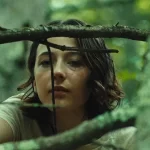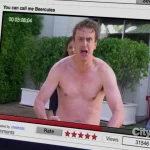The Mountain: Guess I’ll Have to Break the News, by David Bax

This review originally ran as a part of our Sundance 2019 coverage.
Rick Alverson made his name with his third feature, The Comedy, a transcendently uncomfortable film that imagines the thoroughly depressing emotional life of the type of disaffected smartass that, say, Bill Murray spent the 1980s playing. He followed that up with his masterpiece, Entertainment, about a postmodern anti-comedy stand-up touring prisons, bars and backyard parties in an increasingly hellish version of California’s Kern County. His newest film, The Mountain, is an ostensible departure, appearing to have little to do the world of comedy. And yet Tye Sheridan’s Andy, an emotionally stunted virgin manchild, might otherwise have appeared in a Will Ferrell or Judd Apatow movie. The Mountain manages to somehow still be about modern comedy even if it’s Alverson’s least comedic movie.
It’s the 1950s somewhere in the American Northwest and Andy, in the absence of his hospitalized and little discussed mother, lives with his father, Frederick (Udo Kier), and works as a Zamboni driver at the local ice rink. When Frederick dies suddenly, Andy receives an unexpected visit from Dr. Wallace Fiennes (Jeff Goldblum), a traveling lobotomist who operated on Andy’s mom. Wally, as he is known, offers Andy a job driving him from one psychiatric hospital to another and taking before and after photographs of his patients.
In a period-appropriate 1.33:1 aspect ratio, cinematographer Lorenzo Hagerman (who also collaborated with Alverson on Entertainment) gives us a vision of small town, wide open America that is drab in palette but handsomely photographed, not unlike a Sears catalog from the era. In fact, that reference point also applies to The Mountain‘s costuming (by Elizabeth Warn), a vision of the less glamorous side of mid-century men’s fashion. Andy’s short, flannel coat is nonetheless fetching, certainly more so than Wally’s tendency to wear his pants short and his socks shorter, giving us plenty of opportunities to ogle Goldblum’s shins.
At one of the first hospitals Wally and Andy visit together, the patients are in the midst of putting on a talent revue, a creative decision that feels intentionally designed to recall Frederick Wiseman’s Titicut Follies. More than just a passing reference, though, it may be a key to unlocking Wally’s character. His lobotomies and shock treatments (pointedly performed exclusively on women up until a late-narrative turning point) are unpleasant to witness, to say the least. Yet, with Andy and his camera in tow, he insists on documenting them, though not before covering up the post-operation swelling and bruising with his portable makeup kit. Wally is, in his own right, a director, a documentarian, a propagandist. And Alverson may be commenting on his own role of making movies out of terrible things.
The mountain of the title is, of course, a metaphor. As evinced by Denis Lavant’s alcoholic, paranoid schizophrenic artist, it represents some kind of pinnacle of expression (once again, Alverson traffics in self-commentary). But it literally references Andy and Wally’s final destination, Mount Shasta, California. It’s here, at the base of a volcano, that The Mountain sheds whatever comedy it has in its system and turns fully to tragedy, surmising that no one, ultimately, is special, except maybe to one or two other people and, even then, they’ll require you to give up more of yourself than it’s probably worth. Alverson has made his least confrontational movie so far but also perhaps his most hopeless.






























